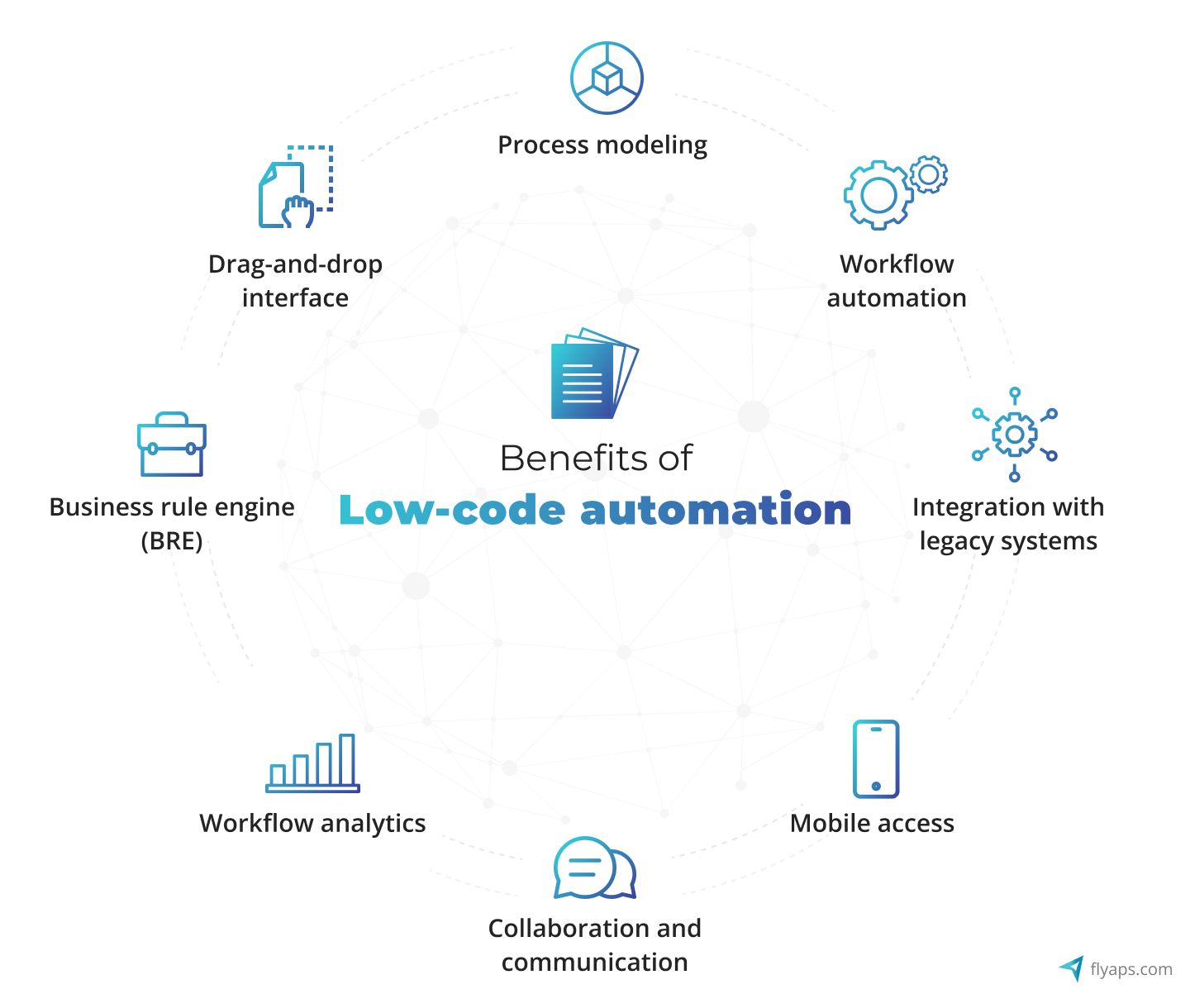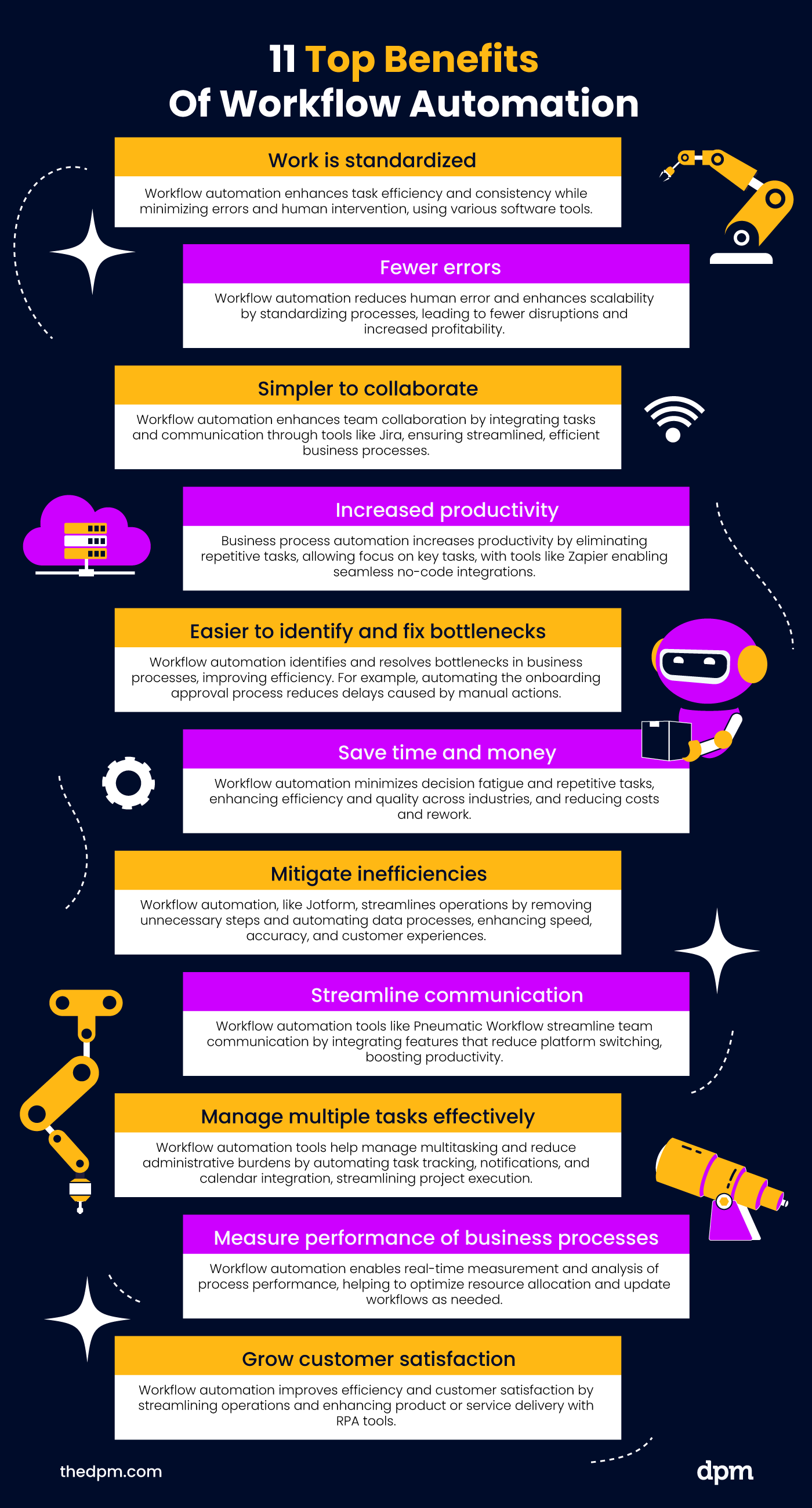Business workflow automation boosts productivity and reduces errors. It saves time and cuts operational costs.
Business workflow automation is essential for modern companies. It streamlines processes and enhances efficiency. Employees can focus on important tasks. Automation handles repetitive jobs quickly. This leads to increased productivity and fewer mistakes. Companies save money by reducing manual labor.
Automated workflows also ensure consistency in operations. Businesses can scale up operations with ease. They can respond faster to market changes. Customers enjoy better service, improving satisfaction. Integrating workflow automation is a smart move for any business. It brings numerous benefits and keeps companies competitive.
Introduction To Workflow Automation
Business workflow automation is changing how companies work. It makes tasks simpler and faster. Automation helps save time and reduce errors. Let’s explore what workflow automation is and why it matters.
What Is Workflow Automation?
Workflow automation uses software to complete tasks. These tasks are often repetitive and time-consuming. Automation tools can handle these tasks without human help.
Many businesses use automation tools. These tools can send emails, update records, and more. Automation makes sure tasks are done on time and correctly.
Importance Of Automation In Business
Automation brings many benefits to businesses. Here are some key points:
- Efficiency: Tasks are done faster with automation.
- Accuracy: Automation reduces human errors.
- Cost Savings: Automation lowers operational costs.
- Productivity: Employees can focus on important work.
- Consistency: Tasks are done the same way every time.
Businesses of all sizes can benefit from automation. It helps them stay competitive and grow.

Credit: flyaps.com
Enhancing Efficiency
Business workflow automation integration significantly enhances efficiency by streamlining processes and reducing manual errors. This improvement allows businesses to operate smoothly and focus on growth.
Streamlining Processes
Automation tools help in streamlining processes. These tools remove unnecessary steps and standardize tasks. This leads to faster completion of work.
Here are some ways automation streamlines processes:
- Automated task assignments ensure the right person gets the task.
- Real-time tracking of progress keeps everyone informed.
- Instant notifications reduce waiting times.
This table summarizes the benefits:
| Task | Benefit |
|---|---|
| Assignment | Right person gets the task |
| Tracking | Everyone stays informed |
| Notifications | Reduces waiting times |
Reducing Manual Errors
Manual errors can slow down your business. Workflow automation significantly reduces manual errors. This ensures tasks are completed correctly every time.
Here are key benefits of reducing manual errors:
- Increased accuracy in data entry.
- Consistency in task completion.
- Fewer mistakes lead to higher customer satisfaction.
Automation reduces human error and boosts overall productivity.
Cost Savings
Integrating business workflow automation offers significant cost savings. It cuts down manual efforts, reduces errors, and streamlines operations.
Lower Operational Costs
Automation reduces the need for manual labor. This leads to lower salary expenses. Automated systems require less oversight. This means fewer management costs. It eliminates human errors, avoiding costly mistakes. Automation software optimizes resource usage, saving more money.
Increased Roi
Businesses see increased ROI with automation. It speeds up processes, leading to faster deliveries. Automation improves customer satisfaction. Happy customers mean repeat business. It also allows for better data analysis. This leads to smarter decisions and higher profits.
| Benefit | Details |
|---|---|
| Lower Salary Expenses | Fewer staff needed due to automated tasks |
| Reduced Management Costs | Less oversight required for automated systems |
| Error Reduction | Minimizes human mistakes, saving correction costs |
| Optimized Resource Usage | Efficient use of resources, reducing waste |
- Faster deliveries
- Improved customer satisfaction
- Smarter business decisions
- Higher profits
Improving Productivity
Business workflow automation integration can significantly improve productivity. It streamlines tasks, minimizes errors, and optimizes resources. This section explores how automation enhances productivity with faster task completion and optimized resource management.
Faster Task Completion
Automation speeds up task completion. Manual processes often involve repetitive steps. Automation tools handle these steps quickly and accurately.
- Tasks that took hours can be done in minutes.
- Automation reduces human error, increasing efficiency.
Faster task completion frees up time for employees. They can focus on more strategic tasks. This boosts overall productivity.
Optimized Resource Management
Automation helps in better resource management. By analyzing data, it allocates resources more effectively.
| Manual Process | Automated Process |
|---|---|
| Requires constant oversight | Runs independently |
| Prone to errors | Minimizes errors |
Optimized resource management ensures tasks are completed on time. It also reduces costs and improves efficiency.
Automation tools can schedule tasks based on priority. This ensures critical tasks are not delayed.
Incorporating workflow automation into your business can lead to significant productivity gains. Faster task completion and optimized resource management are just a few of the many benefits.
Better Collaboration
Integrating workflow automation into your business improves collaboration. It ensures tasks are handled efficiently. Team members can work together seamlessly. Let’s explore how this can be achieved.
Seamless Communication
Workflow automation tools streamline communication. They ensure everyone is on the same page. Messages are sent automatically, reducing delays.
- Real-time updates keep everyone informed.
- Automated notifications ensure no task is missed.
- Centralized communication platforms improve transparency.
This helps teams avoid misunderstandings. They can focus on their tasks without constant follow-ups.
Improved Team Coordination
Automation enhances team coordination. It assigns tasks based on each member’s skills. This ensures that the right person handles the right job.
| Feature | Benefit |
|---|---|
| Task Assignment | Ensures tasks are assigned to the right person. |
| Progress Tracking | Monitors task progress in real-time. |
| Deadline Management | Ensures tasks are completed on time. |
Workflow automation also helps in managing deadlines. It sends reminders to ensure tasks are completed on time. This results in better project outcomes.

Credit: thedigitalprojectmanager.com
Enhanced Data Accuracy
Incorporating business workflow automation brings numerous advantages. One significant benefit is enhanced data accuracy. Automation ensures data is entered correctly and consistently. This improves decision-making and operational efficiency.
Real-time Data Updates
Automation enables real-time data updates. This means data is always current and reliable. Businesses can respond quickly to changes and make informed decisions.
Real-time updates reduce manual checks and save time. It also minimizes the risk of outdated information affecting operations.
Minimized Data Entry Mistakes
Minimized data entry mistakes are another key advantage. Manual data entry is prone to errors. Automation reduces these mistakes significantly.
Automated systems ensure data is consistent and accurate. This results in better data quality and trustworthiness.
Here are some benefits of minimized data entry mistakes:
- Reduced error correction time
- Improved data reliability
- Enhanced operational efficiency
Automation tools validate data during entry. This further ensures correctness and consistency.
Scalability And Flexibility
Business workflow automation integration offers significant benefits, especially in terms of scalability and flexibility. These aspects are crucial for businesses aiming to adapt quickly to changes and grow without restrictions. By leveraging automation, companies can streamline processes, reduce manual errors, and ensure seamless operations as they scale.
Adapting To Growth
Automated workflows help businesses adapt to growth efficiently. As your company expands, the demand for resources and processes increases. Automation handles repetitive tasks, allowing your team to focus on strategic initiatives. This ensures that growth does not compromise quality or productivity.
For example, an automated system can manage customer orders during peak seasons. It processes orders faster and more accurately than a manual system. This reduces delays and improves customer satisfaction.
Customizable Workflows
Customizable workflows offer flexibility. Businesses can tailor automation processes to suit their unique needs. This customization ensures that the automation aligns with specific business goals and operations.
Consider a marketing campaign. An automated workflow can be customized to send emails based on user behavior. This targeted approach increases engagement and conversion rates.
Another example is in project management. Automated workflows can be designed to assign tasks based on employee skills. This ensures that the right person handles each task, improving efficiency and outcomes.
Here is a table illustrating the benefits:
| Benefit | Description |
|---|---|
| Scalability | Handles increased workload without additional resources. |
| Flexibility | Adapts to unique business needs and goals. |
| Efficiency | Reduces manual tasks and errors. |
| Quality | Maintains standards during growth phases. |
In summary, integrating business workflow automation provides scalable and flexible solutions. It supports growth and allows customization to meet specific needs. Embrace automation to ensure your business thrives in a dynamic environment.

Credit: veelead.com
Employee Satisfaction
Employee Satisfaction is a crucial aspect of any successful business. Happy employees are more productive and committed to their work. Integrating business workflow automation can significantly enhance employee satisfaction. Let’s explore how it reduces workload stress and allows employees to focus on strategic tasks.
Reduced Workload Stress
Workflow automation takes over repetitive tasks. This reduces the stress on employees. Employees no longer spend hours on mundane tasks. They can use their time for more meaningful work. This change leads to a healthier work environment.
Automated systems also minimize errors. Fewer mistakes mean less stress. Employees feel more confident in their work. They are less likely to feel overwhelmed. This results in a happier workforce.
Focus On Strategic Tasks
With automation, employees can focus on strategic tasks. They spend more time on creative and critical work. This boosts their job satisfaction. Strategic tasks are more engaging and fulfilling.
Employees develop new skills and grow professionally. They feel valued and important. This sense of achievement enhances their satisfaction. A motivated workforce drives the company’s success.
Frequently Asked Questions
What Is Business Workflow Automation?
Business workflow automation involves using technology to streamline and automate business processes. It reduces manual effort and increases efficiency. This leads to faster task completion, fewer errors, and improved productivity.
Why Integrate Business Workflow Automation?
Integrating workflow automation optimizes operations and improves efficiency. It eliminates repetitive tasks and reduces errors. This results in cost savings and better resource utilization.
How Does Workflow Automation Improve Productivity?
Workflow automation reduces manual tasks, allowing employees to focus on higher-value activities. This increases overall productivity and enhances business performance. Automation ensures consistency and accuracy in processes.
Can Small Businesses Benefit From Workflow Automation?
Yes, small businesses can benefit significantly from workflow automation. It helps streamline operations, reduce costs, and improve efficiency. This leads to better resource management and competitive advantage.
Conclusion
Business workflow automation boosts productivity and reduces errors. It saves time and money. Employees focus on more important tasks. Customer satisfaction increases with faster service. Embrace automation for smoother operations and better results. Start integrating automation today and watch your business grow.





